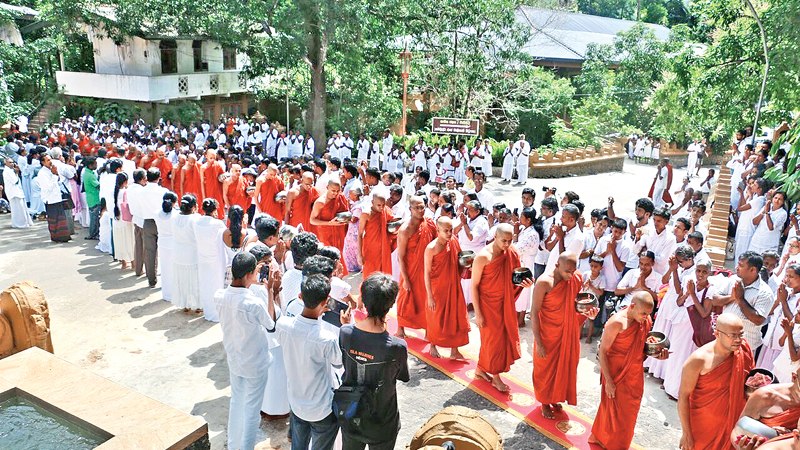Fatigue is very much a given in the modern society. That is a part and parcel of our lifestyle, yet most of us are clueless as to how to get rid of it. When tiredness affects humans it knows no humanity. The humans are occupied with a ceaseless struggle. About two millennia ago, the Buddha emerged in this world to show the path to steer clear of tiredness.
 Since then, various Buddhist masters surfaced and resurfaced to elaborate the Buddha’s path in simple language. That said, Venerable Kiribathgoda Gnanananda Thera is no stranger to Sri Lankan Buddhists.
Since then, various Buddhist masters surfaced and resurfaced to elaborate the Buddha’s path in simple language. That said, Venerable Kiribathgoda Gnanananda Thera is no stranger to Sri Lankan Buddhists.
He was, however, a lesser known figure about 18 years ago. When he established a small abode in Polgahawela in August 1999, he had monastic relaxation in mind. The Venerable Thera had been fed up with his pursuits for the truth in the Himalayas. When he began studying the Buddhist Suttas, Venerable Gnanananda Thera was overwhelmed by the joy of discovering a lost treasure. He wanted to pass that knowledge in simple terms.
In this small abode, completed in wattle and daub, the Venerable Thera began preaching the Buddha’s teachings. The people grew attracted to him, little by little. Within no time, he became a trendy figure among the local Buddhist masters. Consequently, he was being invited to preach the Buddha’s Dhamma from various quarters of the island.
His Dhamma programmes were usually held over the weekend. Throughout the day, the participants were engaged in meditation, listening to the Dhamma and studying the Buddha’s teachings. The philanthropists of the area came to the fore to offer alms to this crowd. Alms were no issue at all, thanks to a large number of generous donors.
 The crowds swarmed from distant areas such as Kandy, Colombo, Bandarawela, Anuradhapura, Kurunegala, and Kegalla. The Dhamma Salas were erected to accommodate that large crowd. And then the urge to build branches across the island surfaced. The donors willingly donated lands to erect monasteries as branches of Mahamevna.
The crowds swarmed from distant areas such as Kandy, Colombo, Bandarawela, Anuradhapura, Kurunegala, and Kegalla. The Dhamma Salas were erected to accommodate that large crowd. And then the urge to build branches across the island surfaced. The donors willingly donated lands to erect monasteries as branches of Mahamevna.
As the programme slowly expanded its wings, another crowd grew interest in taking up robes. They were mostly the youths, already occupied in employment following proper education. They had been taking part in the Mahamevna programmes consecutively. However, becoming a monk was not done in haste. They had to live an Upasaka life for a period of one year in the company of the Buddhist monks according to a strict timetable. If they still find it comfortable to stay in sync with the monk schedule, they will be ordained as novice monks.
The Mahamevna now has about 790 monks with 51 branches in Sri Lanka and 26 branches worldwide. Venerable Kekirawe Bodhi Thera, currently the Abbot of Polgahawela Monastery, spoke to Daily News about the 18th anniversary of Mahamevna.
“When the Mahamevna turned 10 years, Venerable Kiribathgoda Gnanananda Thera spearheaded a project to look after the sickly.”
A maternity ward was completed and handed over to a hospital in Ratnapura.
Another project initiated by the Mahamevna programme is donating clean water to the CKDu-affected areas.
“The kidney disease is becoming a huge issue. Many people approach our monastery in search of a new kidney. Some other people come in search of funds to cure their sicknesses. So we chose areas such as Rajarata and Eastern province to execute this project. We got the philanthropists to donate clean water. Within a year we have donated more than 10 millions of litres of clean water.”
And now the reports Kidney-affected cases are becoming lesser thanks to the ability to consume filtered water.
Sraddha and Lakviru Radio are two electronic media projects initiated by the Mahamevna in addition to the newspaper Mahamegha.
Tavatimsa programme has been initiated to expel the common myths among the humans about the celestial worlds. While engaged in social charity, the members of the Tavatimsa programme are supposed to conduct a virtuous lifestyle.
“We used to have a common myth about the celestial world. What is it? That the devas cannot understand the Dhamma and reach its fruition. That is a common myth. Because of this, most people abandoned the idea of being reborn in the celestial world. When that happens, our fate is more dangerous. Our chances to reborn in the hell realm are more when we give up the idea of being reborn in the celestial world,” Venerable Bodhi Thera explained.
The mission is to engage in various meritorious deeds faith, charity and wisdom in order to reach the celestial world. Sakkha, the chief of the gods, dwells in Chatummaharajikaya and Tavatinsaya. Tavatinsa Yathra is the vehicle to reach the Tavatinsa.




Add new comment